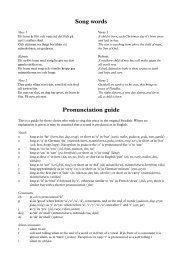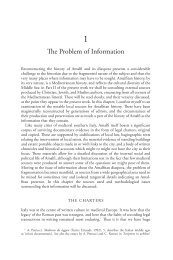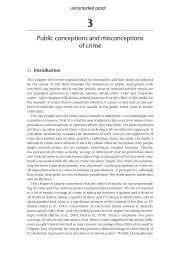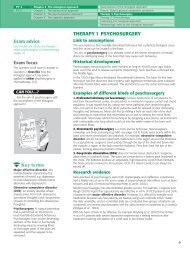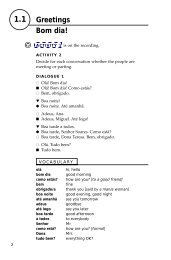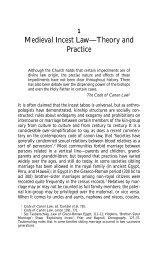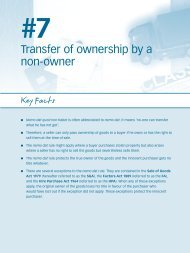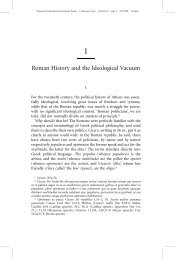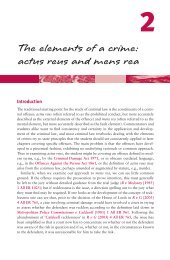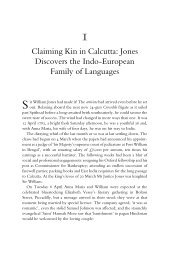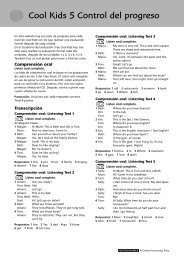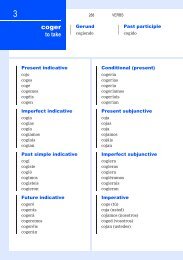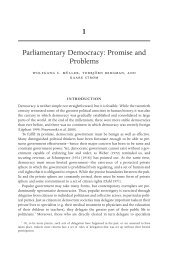Create successful ePaper yourself
Turn your PDF publications into a flip-book with our unique Google optimized e-Paper software.
24<br />
1A.1<br />
1<br />
hören<br />
2<br />
sprechen<br />
Hör zu. Was passt zusammen?<br />
L<strong>ist</strong>en and match the correct pictures to the sentences.<br />
Beispiel: a 4<br />
a<br />
b<br />
<strong>Das</strong> <strong>ist</strong> <strong>meine</strong> Mutter.<br />
Wer <strong>ist</strong> das? A B.<br />
A points to a picture and asks who it is,<br />
B answers as if he or she is Nico.<br />
Beispiel: A Wer <strong>ist</strong> das?<br />
B <strong>Das</strong> <strong>ist</strong> <strong>meine</strong> Schwester!<br />
<strong>Das</strong> <strong>ist</strong> <strong>meine</strong> <strong>Familie</strong>!<br />
Vocabulary: say who there is in your family<br />
Grammar: use <strong>meine</strong>(e)/dein(e) (my/your)<br />
Skills: think about language patterns<br />
1<br />
4 6<br />
c<br />
5<br />
e<br />
<strong>Das</strong> <strong>ist</strong> <strong>meine</strong> Oma. <strong>Das</strong> <strong>ist</strong> <strong>meine</strong> Schwester.<br />
<strong>Das</strong> <strong>ist</strong> mein Vater. d <strong>Das</strong> <strong>ist</strong> mein Opa. f <strong>Das</strong> <strong>ist</strong> mein Bruder Ulli.<br />
Think<br />
2<br />
3<br />
7<br />
g <strong>Das</strong> <strong>ist</strong> mein Bruder Ralf.<br />
Can you find the odd one out in each group?<br />
1 <strong>meine</strong> Mutter mein Bruder <strong>meine</strong> Schwester<br />
2 mein Vater <strong>meine</strong> Mutter mein Opa<br />
3 <strong>meine</strong> Tante <strong>meine</strong> Oma <strong>meine</strong> Großeltern<br />
Hör zu. Welcher Name passt?<br />
L<strong>ist</strong>en and match the correct names to the family members.<br />
Beispiel: <strong>meine</strong> Großeltern – Elisabeth + …<br />
Mein Stammbaum. A B.<br />
Write your own family tree as in activity 3.<br />
Then take turns to ask each other questions.<br />
Beispiel: A Wer <strong>ist</strong> Susan?<br />
B <strong>Das</strong> <strong>ist</strong> <strong>meine</strong> Mutter.<br />
Mein oder <strong>meine</strong>?<br />
Fill in the gaps with either mein or <strong>meine</strong>.<br />
Beispiel: mein Vater<br />
a Tante b Bruder c Großeltern<br />
d Schwester e Opa f <strong>Familie</strong><br />
g Onkel<br />
Lies Toms Nachricht.<br />
Read Tom’s message and answer the questions in English.<br />
Hallo!<br />
Ich heiße Tom und ich bin vierzehn<br />
Jahre alt. Mein Vater heißt Uwe<br />
und <strong>meine</strong> Mutter heißt Vera.<br />
Meine Schwester heißt Klara. Mein<br />
Bruder heißt Sebastian. Und <strong>meine</strong><br />
Großeltern? Mein Opa heißt Walter und<br />
<strong>meine</strong> Oma heißt Ruth.<br />
Meine <strong>Familie</strong> El cole<br />
vierundzwanzig See Zoom OxBox<br />
See Zoom OxBox<br />
fünfundzwanzig<br />
3<br />
hören<br />
4<br />
sprechen<br />
NC 1–2<br />
5<br />
schreiben<br />
6<br />
lesen<br />
<strong>meine</strong> Großeltern<br />
<strong>meine</strong> Eltern mein Onkel <strong>meine</strong> Tante<br />
mein Bruder ich!<br />
a What are the names of Tom’s parents?<br />
b What are his brother and s<strong>ist</strong>er called?<br />
c What are the names of his grandparents?<br />
Wer <strong>ist</strong> das?<br />
Challenge<br />
1A.1<br />
<strong>Das</strong> <strong>ist</strong> mein/dein Vater/Opa/Bruder/Onkel.<br />
<strong>meine</strong>/deine <strong>Familie</strong>/ Mutter/Oma/<br />
Schwester/Tante.<br />
<strong>Das</strong> sind <strong>meine</strong>/deine Eltern/Großeltern.<br />
Er/sie heißt …<br />
Sie (pl.) heißen …<br />
Anna Elisabeth<br />
Franz Karl<br />
Kathi Markus<br />
Peter Sandra<br />
Think<br />
When would you use mein/<strong>meine</strong><br />
and when dein/deine when talking<br />
about family members?<br />
Write a message like Tom’s<br />
about your own family.<br />
Try to write three sentences.<br />
NC 2<br />
25
26<br />
1A.2<br />
1<br />
video<br />
2<br />
video<br />
3<br />
hören<br />
NC 2<br />
Sieh dir Nicos Videoblog<br />
an. Was passt für Nico?<br />
Watch Nico’s video blog.<br />
Which set of photos matches<br />
his family?<br />
La Ich hora habe y einen el horario Bruder<br />
• Vocabulary: say what time talk it about is and brothers when your and lessons s<strong>ist</strong>ersare<br />
• practise Grammar: using ich habe the verb eine(n)/keine(n) tener, use the …verb<br />
ser with telling the time<br />
• tell Skills: the work time, out transfer new language previous and knowledge plural patterns<br />
Sieh dir das Video an. Was passt für Ali und Kathi?<br />
Watch the video. Which sentence matches Ali, and which Kathi?<br />
a<br />
c<br />
Ich habe einen Bruder.<br />
b e<br />
Ich habe eine Schwester.<br />
Ich habe eine Schwester<br />
und zwei Brüder.<br />
d<br />
f<br />
Ich habe zwei Brüder.<br />
Hör zu. Geschw<strong>ist</strong>er. Was passt?<br />
L<strong>ist</strong>en. Which picture matches Maren, Alex, Sandra and Carsten?<br />
Beispiel: Maren 4<br />
1 2 3 4<br />
Grammatik ➞ p.162, p.167<br />
Ich habe einen/keinen ...<br />
The German word for ‘a’ (ein) sometimes changes in a<br />
sentence – but only for masculine nouns:<br />
m ein Bruder ➞ Ich habe einen Bruder. (ein + -en)<br />
f eine Schwester ➞ Ich habe eine Schwester.<br />
If you want to say you don’t have something, you use keinen/<br />
keine in the same way:<br />
m Ich habe keinen Bruder. (kein + -en)<br />
f Ich habe keine Schwester.<br />
pl Ich habe keine Geschw<strong>ist</strong>er.<br />
1<br />
Ich habe zwei Schwestern.<br />
Ich bin Einzelkind – ich<br />
habe keine Geschw<strong>ist</strong>er.<br />
Ali<br />
2<br />
Think<br />
Kathi<br />
You know that eine is feminine<br />
and ein masculine – can you figure<br />
out what einen means?<br />
<strong>Das</strong> <strong>ist</strong> eine Schwester.<br />
➞ Ich habe eine Schwester.<br />
<strong>Das</strong> <strong>ist</strong> ein Bruder.<br />
➞ Ich habe einen Bruder.<br />
Füll die Lücken aus.<br />
Fill in the gaps with eine/einen (3) or keine/keinen (✗).<br />
Ich habe …<br />
Beispiel: eine Mutter 3<br />
a Schwester. ✗ d Schwester. 3<br />
b Bruder. 3 e Bruder. ✗<br />
c Geschw<strong>ist</strong>er. ✗<br />
Umfrage: Hast du Geschw<strong>ist</strong>er?<br />
Do a survey: Do you have siblings?<br />
Make notes of your classmates‘ answers.<br />
Beispiel:<br />
A Hast du Geschw<strong>ist</strong>er?<br />
B Ja, ich habe einen Bruder.<br />
Ratespiel: Wer <strong>ist</strong> das?<br />
A chooses a student from the group survey in activity 5,<br />
B guesses who it is.<br />
Beispiel:<br />
A Ich habe zwei Schwestern.<br />
B <strong>Das</strong> <strong>ist</strong> Sarah!<br />
Füll die Lücken aus.<br />
Read the sentences and fill in the gaps.<br />
Meine <strong>Familie</strong> El El cole<br />
cole<br />
sechsundzwanzig See Zoom OxBox<br />
See Zoom OxBox<br />
siebenundzwanzig<br />
4<br />
schreiben<br />
5<br />
sprechen<br />
NC 2<br />
6<br />
sprechen<br />
7<br />
lesen<br />
NC 2<br />
a<br />
Ich heiße Joe Jonas und ich bin<br />
21 Jahre alt. Ich habe<br />
– Nick und Kevin.<br />
Ich heiße Harry Potter. Ich bin 18<br />
Jahre alt. Ich habe –<br />
ich bin .<br />
c<br />
James: 1 Bruder<br />
b<br />
1A.2<br />
What is the difference between:<br />
Bruder and Brüder?<br />
Schwester and Schwestern?<br />
When would you use the second<br />
words instead of the first ones?<br />
Hast du Geschw<strong>ist</strong>er?<br />
einen Bruder?<br />
eine Schwester?<br />
Ja, ich habe einen Bruder.<br />
eine Schwester.<br />
zwei Brüder.<br />
zwei Schwestern.<br />
Nein, ich habe keinen Bruder.<br />
keine Schwester.<br />
keine Geschw<strong>ist</strong>er.<br />
Nein, ich bin Einzelkind.<br />
Challenge<br />
Think<br />
Ich heiße Serena Williams.<br />
Ich bin 28 Jahre alt. Ich habe<br />
– Venus.<br />
Write a speech bubble about<br />
yourself, or pretend you are<br />
your favourite star, and read<br />
it to the class.<br />
NC 2<br />
27
28<br />
1A.2 1A.3<br />
1<br />
hören<br />
2<br />
sprechen<br />
3<br />
hören<br />
4<br />
hören<br />
5<br />
schreiben<br />
NC 2–3<br />
Hör zu. Was passt zusammen?<br />
L<strong>ist</strong>en and match the pictures (1–9)<br />
with the pets (a– i).<br />
Ich habe …<br />
Beispiel: a 7<br />
a einen Hund<br />
b einen Fisch<br />
c einen Wellensittich<br />
d eine Katze<br />
e eine Maus<br />
f eine Schildkröte<br />
g ein Meerschweinchen<br />
h ein Pferd<br />
i ein Kaninchen<br />
Hör zu und lies.<br />
L<strong>ist</strong>en and read.<br />
La Hast hora du y ein el Haustier? horario<br />
• Vocabulary: say what time talk it about is and pets when and your colours lessons are<br />
• practise Grammar: using use er/sie/es the verb tener, and noun use plurals the verb correctly ser with telling the time<br />
• tell Skills: the strategies time, transfer for learning previous new knowledge words and their plurals<br />
Was hast du? A B.<br />
What do you have? A says a picture number, B says the answer.<br />
Beispiel: A Nummer 3!<br />
B Ich habe eine Katze.<br />
Hör zu und lies. Farben.<br />
L<strong>ist</strong>en and read. Colours.<br />
blau braun gelb grau grün orange rot schwarz weiß<br />
a <strong>Das</strong> <strong>ist</strong> ein Huhn. Es <strong>ist</strong> gelb.<br />
b <strong>Das</strong> <strong>ist</strong> ein Hamster. Er <strong>ist</strong> braun.<br />
c <strong>Das</strong> <strong>ist</strong> eine Schlange. Sie <strong>ist</strong> grün.<br />
Grammatik ➞ p.35<br />
Unlike in English, animals are called ‘he’, ‘she’ or ‘it’ depending<br />
on which gender they are.<br />
masculine feminine neuter<br />
ein Hund ➞ er eine Katze ➞ sie ein Pferd ➞ es<br />
Schreib Sätze.<br />
Choose six pets from activity 1 and write sentences.<br />
Beispiel: <strong>Das</strong> <strong>ist</strong> eine Katze. Sie <strong>ist</strong> weiß und schwarz.<br />
3<br />
6<br />
7<br />
5<br />
8 9 2<br />
Think<br />
Which letter do you add to eine to<br />
say ‘I don’t have a cat’?<br />
a b c<br />
4<br />
1<br />
Hör zu und lies.<br />
L<strong>ist</strong>en and read.<br />
Grammatik ➞ p.162<br />
German nouns form their plurals (more-than-one form) in<br />
different ways:<br />
ein Hund ➞ zwei Hunde<br />
eine Katze ➞ zwei Katzen<br />
ein Kaninchen ➞ zwei Kaninchen(-)<br />
eine Maus ➞ zwei Mäuse<br />
Each time you learn a new noun, try to learn its plural too!<br />
Finde die Pluralformen.<br />
Find the plurals for these words on the Vocabulary page or in<br />
the Glossary.<br />
Beispiel: eine Katze – zwei Katzen<br />
a ein Huhn<br />
b ein Meerschweinchen<br />
c eine Schlange<br />
d ein Pferd<br />
Was <strong>ist</strong> die Pluralform? A B.<br />
A names a pet and B gives the plural.<br />
Beispiel: A ein Hund!<br />
B zwei Hunde!<br />
Meine <strong>Familie</strong> El El cole<br />
cole<br />
achtundzwanzig See Zoom OxBox<br />
See Zoom OxBox<br />
neunundzwanzig<br />
6<br />
hören<br />
7<br />
schreiben<br />
8<br />
sprechen<br />
Challenge<br />
1A.2 1A.3<br />
Ich habe zwei Hunde, drei Katzen, vier<br />
Kaninchen, fünf Schildkröten, sechs<br />
Wellensittiche, sieben Hamster, acht<br />
Mäuse und neun Fische!<br />
Memory game. Name as<br />
many pets as possible, first<br />
on your own, then with a<br />
partner, and then share your<br />
l<strong>ist</strong> with the rest of<br />
the class!<br />
Beispiel:<br />
A Ich habe einen Hund …<br />
B Ich habe einen Hund und<br />
eine Katze …<br />
NC 1–2<br />
29
30<br />
1A.2 1A.4<br />
1<br />
lesen<br />
2<br />
schreiben<br />
3<br />
hören<br />
NC 2<br />
La Wie hora b<strong>ist</strong> y du? el horario<br />
• Vocabulary: say what time describe it is and yourself, when your lessons friends are and family<br />
• practise Grammar: using ich bin/du the verb b<strong>ist</strong>/er tener, <strong>ist</strong>/sie use the <strong>ist</strong> verb + adjectives ser with telling the time<br />
• tell Skills: the learn time, how transfer to pronounce previous the knowledge ü and sch sounds in German;<br />
work out the meaning of new words<br />
Wie heißt das auf Englisch?<br />
Find the English translations for the adjectives<br />
below. Do as many as you can, then use the<br />
Vocabulary page or the Glossary to help you.<br />
Beispiel: klein – small<br />
a b c<br />
Positiv oder negativ?<br />
Are the adjectives positive or negative?<br />
Write two l<strong>ist</strong>s. Then compare your l<strong>ist</strong>s with<br />
a partner.<br />
Beispiel: positive negative<br />
nett …<br />
Hör zu. Wie b<strong>ist</strong> du?<br />
L<strong>ist</strong>en and write down the adjectives that apply<br />
to Kathi, Ali, Nina and Nico.<br />
Beispiel: Kathi – groß, …<br />
You can work some words out because they look like<br />
English words. Check the others on the Vocabulary page.<br />
Ich bin klein, nett und<br />
romantisch. Ich bin intelligent und fleißig. Ich bin musikalisch und laut.<br />
d e f<br />
Ich bin sportlich. Ich bin faul und frech. Ich bin groß und schüchtern.<br />
4<br />
sprechen<br />
NC 2<br />
Think<br />
Ist alles richtig?<br />
A chooses a person from activity 3.<br />
B answers for him or her.<br />
Beispiel: A Kathi, wie b<strong>ist</strong> du?<br />
B Ich bin …<br />
Wörter mit ü.<br />
L<strong>ist</strong>en and repeat.<br />
Hör zu und lies.<br />
L<strong>ist</strong>en and read.<br />
Hör zu und mach Notizen. (a–d)<br />
What are Sven, Anne, Markus and Tanja like? L<strong>ist</strong>en and make<br />
notes (adjective + 33, 3, ✗ or ✗✗).<br />
Beispiel: a Sven klein 3 faul ✗✗<br />
Meine <strong>Familie</strong> El El cole<br />
cole<br />
dreißig See Zoom OxBox<br />
See Zoom OxBox<br />
einunddreißig<br />
5<br />
hören<br />
7<br />
hören<br />
8<br />
schreiben<br />
NC 1–2<br />
9<br />
hören<br />
10<br />
hören<br />
1A.2 1A.4<br />
a <strong>Das</strong> <strong>ist</strong> eine Schildkröte. c Susi Schuhmann <strong>ist</strong> schüchtern.<br />
b <strong>Das</strong> <strong>ist</strong> eine Schlange. d Meine Schwester <strong>ist</strong> schrecklich!<br />
Hör zu und lies.<br />
L<strong>ist</strong>en and check your pronunciation of a–d in activity 6.<br />
Wie b<strong>ist</strong> du?<br />
What are you like? Choose three adjectives and write sentences.<br />
Beispiel: Ich bin groß. Und ich bin ...<br />
<strong>Das</strong> <strong>ist</strong> <strong>meine</strong> Freundin Lisa.<br />
Sie <strong>ist</strong> nicht romantisch –<br />
aber sie <strong>ist</strong> ziemlich sportlich!<br />
The word und means ‘and’ and is used to link words and<br />
sentences together. Can you guess what the linking word aber<br />
in activity 9 means?<br />
NC 2<br />
a<br />
Think<br />
6<br />
sprechen<br />
Wörter mit sch.<br />
Take it in turns to read out the sch phrases.<br />
b<br />
sehr = 33<br />
ziemlich = 3<br />
nicht = ✗<br />
gar nicht = ✗✗<br />
<strong>Das</strong> <strong>ist</strong> mein Freund Andi.<br />
Er <strong>ist</strong> sehr laut – und er <strong>ist</strong><br />
gar nicht musikalisch …<br />
Challenge<br />
Describe your family<br />
members to a partner.<br />
Beispiel:<br />
A Wie <strong>ist</strong> deine Mutter?<br />
B Sie <strong>ist</strong> sehr nett, aber …<br />
NC 2<br />
31
32<br />
1A.2 1A.5 La ❯❯❯ hora Nicos y Videoblog el horario ❯❯❯<br />
1<br />
video<br />
NC 2<br />
Ni&Co<br />
• Vocabulary: say what time zoo it animals is and when your lessons are<br />
• practise Grammar: using ich habe the verb ein(e)(n)/kein(e)(n) tener, use the verb …; das ser <strong>ist</strong> with ein(e) telling + animal; the time<br />
• tell er/sie/es the time, <strong>ist</strong> + transfer adjective previous knowledge<br />
Skills: learn how to pronounce v and ei<br />
Sieh dir das Video an. Richtig (✓) oder falsch (✗)?<br />
Watch the video. Which sentences are true (✓) and which are false (✗)?<br />
Beispiel: a ✓<br />
a I’m 14 years old.<br />
b I live in Bremen.<br />
c I have a s<strong>ist</strong>er and two brothers.<br />
d Ulli is 16 years old.<br />
e Ulli is tall, musical and shy.<br />
f Ralf is sporty and intelligent – and lazy.<br />
g Britta is 19 years old.<br />
h Britta is naughty, loud and not very nice.<br />
Info<br />
Pinnwand Fotos +<br />
Blog-Name: Ni&Co<br />
Land: Deutschland Boxes<br />
Alter: 14<br />
Geburtstag: 13. September<br />
Idol: Isaac Boakye (Fußballer)<br />
Wie sagt man das?<br />
Look at the words and try to guess how they are pronounced.<br />
a ein Vogel b ein Affe c ein Bär d ein Delfin<br />
e ein Elefant f eine Giraffe g ein Löwe h ein Nashorn<br />
i ein Papagei j ein Tiger<br />
Was passt zusammen?<br />
Match the words (a–j) in activity 2 with the pictures (1–10).<br />
Meine <strong>Familie</strong> El El cole<br />
cole1A.5 1A.2<br />
zweiunddreißig See Zoom OxBox<br />
See Zoom OxBox<br />
dreiunddreißig<br />
2<br />
sprechen<br />
3<br />
lesen<br />
6<br />
4<br />
hören<br />
5<br />
hören<br />
1<br />
NC 1–2<br />
6<br />
sprechen<br />
NC 1–2<br />
Beispiel: a 9<br />
Hör zu (1–10). Ist alles richtig?<br />
L<strong>ist</strong>en and check your answers – and your pronunciation!<br />
Hör zu (1–10). Wie <strong>ist</strong> er/sie/es?<br />
L<strong>ist</strong>en and look at the pictures above. Describe the animal.<br />
Beispiel: 1 ein Delfin – er <strong>ist</strong> sportlich.<br />
2<br />
Macht Dialoge! A B.<br />
A says a number. B says which animal it is and what it is like.<br />
Beispiel: A Nummer 1!<br />
B <strong>Das</strong> <strong>ist</strong> ein Delfin. Er <strong>ist</strong> sportlich!<br />
7<br />
8<br />
3<br />
9<br />
4<br />
10<br />
The sound v in Vogel is<br />
pronounced like the English f<br />
in ʻforʼ.<br />
The sound ei in Papagei is<br />
pronounced like the y in ʻmyʼ or<br />
ie in ʻpieʼ.<br />
Challenge<br />
Think<br />
Describe your pets.<br />
Beispiel: Ich habe zwei Hunde –<br />
Benno und Snoopy. Benno<br />
<strong>ist</strong> sehr klein. Snoopy <strong>ist</strong><br />
ziemlich frech.<br />
5<br />
NC 2<br />
33
1 Fill in the gaps with the correct forms of mein(e) or dein(e).<br />
34<br />
1A.6<br />
Beispiel: Ist das dein Vater?<br />
a <strong>Das</strong> <strong>ist</strong> m Mutter. d Ist das d Tante?<br />
b Wie <strong>ist</strong> d Freund? e <strong>Das</strong> <strong>ist</strong> m Hamster.<br />
c <strong>Das</strong> sind m Großeltern. f Wie <strong>ist</strong> d Schwester?<br />
2 Choose the correct form of ein(e)(n).<br />
Beispiel: Ich habe eine/einen Hund. (m)<br />
a Ich habe ein/einen Wellensittich. (m)<br />
b Ich habe ein/eine Schildkröte. (f)<br />
c Ich habe einen/ein Meerschweinchen. (n)<br />
d Ich habe eine/einen Fisch. (m)<br />
e Ich habe ein/einen Hamster. (m)<br />
f Ich habe einen/ein Kaninchen. (n)<br />
Sprachlabor<br />
Possessive adjectives, gender and negatives<br />
mein/<strong>meine</strong>, dein/deine<br />
Possessive adjectives like mein (my) and dein (your) show who or what<br />
something belongs to (my dog, your brother etc.).<br />
<strong>Das</strong> <strong>ist</strong> <strong>meine</strong> Schwester. That is my s<strong>ist</strong>er.<br />
Ist das dein Vater? Is that your father?<br />
They come before the noun they describe in place of ein/eine/ein:<br />
masculine (m) feminine (f) neuter (n) plural (pl)<br />
my mein Vater <strong>meine</strong> Katze mein Pferd <strong>meine</strong> Eltern<br />
your dein Vater deine Katze dein Pferd deine Eltern<br />
Ich habe einen/eine/ein …<br />
The German word for ‘a’ sometimes changes in<br />
a sentence – but this change only happens for<br />
masculine nouns:<br />
m <strong>Das</strong> <strong>ist</strong> ein Hund. ➞ Ich habe einen Hund.<br />
f <strong>Das</strong> <strong>ist</strong> eine Katze. ➞ Ich habe eine Katze.<br />
n <strong>Das</strong> <strong>ist</strong> ein Pferd. ➞ Ich habe ein Pferd.<br />
3 Fill in the gaps with the correct negatives.<br />
Beispiel: Ich habe keine Katze. (f)<br />
a Ich habe Maus. (f)<br />
b Ich habe Hamster. (m)<br />
c Ich habe Wellensittich. (m)<br />
d Ich habe Huhn. (n)<br />
4 Write down er, sie or es for these nouns.<br />
Beispiel: ein Hund er<br />
a eine Schildkröte<br />
b ein Meerschweinchen<br />
c ein Kaninchen<br />
d ein Wellensittich<br />
Using a bilingual dictionary<br />
5 Look at extract a from a bilingual dictionary.<br />
Where does it say …<br />
a … what the gender of the noun is?<br />
b … what the plural of the noun is?<br />
6 Now look at b. Where does it say …<br />
a … if the word is a verb?<br />
b … if the word is an adjective?<br />
7 Use a dictionary to translate the underlined words.<br />
a This is a polar bear. ➞ <strong>Das</strong> <strong>ist</strong> ein .<br />
b My brother is very thin. ➞ Mein Bruder <strong>ist</strong> sehr .<br />
c We have a rat as a pet. ➞ Wir haben eine als Haustier.<br />
Pronunciation – ü and sch<br />
8 The German sound ü is called an umlaut. L<strong>ist</strong>en carefully: do<br />
you hear ü or not? (1–8)<br />
9 L<strong>ist</strong>en. How many sch sounds can you hear – more than two?<br />
Meine <strong>Familie</strong><br />
vierunddreißig See Zoom OxBox<br />
See Zoom OxBox<br />
fünfunddreißig<br />
b<br />
a<br />
schön adjective<br />
1 beautiful<br />
2 nice<br />
1A.6<br />
Negatives (ich habe keinen/keine/kein …)<br />
To say you don’t have something, you need a<br />
negative: kein. This follows the same pattern as ein:<br />
m ein Hund ➞ Ich habe keinen Hund.<br />
f eine Katze ➞ Ich habe keine Katze.<br />
n ein Pferd ➞ Ich habe kein Pferd.<br />
er/sie/es<br />
All German nouns are masculine (Maskulinum),<br />
feminine (Femininum) or neuter (Neutrum). This is<br />
called their gender. The words for ‘he’, ‘she’ and ‘it’<br />
depend on the gender of the noun they replace:<br />
m ein Hund ➞ er<br />
f eine Katze ➞ sie<br />
n ein Pferd ➞ es<br />
der Stiefvater (plural die Stiefväter)<br />
stepfather<br />
spielen verb (perfect hat gespielt)<br />
1 to play<br />
2 to gamble<br />
3 to act<br />
35
1A.7 Extra Star<br />
Vocabulary: practise words for colours, pets and family<br />
Grammar: revise some of the grammar of the unit<br />
Skills: practise reading skills<br />
36<br />
1<br />
lesen<br />
NC 1<br />
2<br />
schreiben<br />
NC 1<br />
3<br />
lesen<br />
NC 1<br />
4<br />
lesen<br />
NC 1–2<br />
Match the colours.<br />
Beispiel: a 4<br />
a braun d blau<br />
b rot e gelb<br />
c grün f schwarz<br />
Write out these words correctly.<br />
Beispiel: a eine Katze<br />
eine AZKET ein MTSAHRE ein DREFP ein HCNAKINNE ein NUHD ein HICFS<br />
Match the pictures.<br />
Beispiel: a 5<br />
a Ich bin frech!<br />
b Ich bin sportlich!<br />
c Ich bin groß!<br />
d Ich bin musikalisch!<br />
e Ich bin klein!<br />
f Ich bin faul!<br />
1<br />
Look at Anja’s family tree and read her statements. Can you fill in the gaps?<br />
Beispiel: Meine Oma heißt Ilse.<br />
a Mein Vater heißt .<br />
b Meine heißt Susi.<br />
c Mein Opa heißt .<br />
d Ich habe eine .<br />
e Ich habe zwei .<br />
1 2 3<br />
4 5 6<br />
a b c d e<br />
f<br />
Heinz<br />
2 4<br />
3<br />
Ilse<br />
5<br />
Uwe Susi<br />
Anja Julia Tim Daniel<br />
6<br />
1A.7 Extra Plus<br />
Vocabulary: practise words for family, colours and pets<br />
Grammar: practise using er/sie/es, eine(n) and keine(n)<br />
Skills: practise reading skills<br />
Was passt zusammen?<br />
sechsunddreißig See Zoom OxBox<br />
See Zoom OxBox<br />
siebenunddreißig<br />
1<br />
lesen<br />
2<br />
schreiben<br />
a<br />
NC 2<br />
NC 2<br />
3<br />
schreiben<br />
NC 2<br />
4<br />
lesen<br />
NC 2<br />
Beispiel: a 3<br />
a Wie heißt du?<br />
b Hast du Geschw<strong>ist</strong>er?<br />
c Ist das deine Tante?<br />
d Wie <strong>ist</strong> dein Freund?<br />
e Hast du ein Haustier?<br />
f Wie b<strong>ist</strong> du?<br />
Haustiere und Farben – schreib Sätze.<br />
Beispiel: <strong>Das</strong> <strong>ist</strong> eine Katze. Sie <strong>ist</strong> schwarz.<br />
Geschw<strong>ist</strong>er – Ich habe eine(n)/keine(n) …<br />
Write sentences about siblings.<br />
Beispiel: ➞ Ich habe einen Bruder.<br />
a b c d e<br />
✕<br />
b<br />
Richtig oder falsch?<br />
Read David’s text and his<br />
statements below. Are they<br />
true or false?<br />
a Ich habe keine Großeltern.<br />
b Ich bin kein Einzelkind.<br />
c Ich habe drei Geschw<strong>ist</strong>er.<br />
d Ich habe ein Haustier.<br />
1 Ja, ich habe einen Hund.<br />
2 Er <strong>ist</strong> sportlich und nett.<br />
3 Ich heiße Sascha.<br />
4 Nein, ich bin Einzelkind.<br />
5 Ich bin musikalisch und fleißig.<br />
6 Nein, das <strong>ist</strong> <strong>meine</strong> Mutter.<br />
c<br />
✕<br />
d<br />
Ich heiße David. Ich habe eine Oma<br />
und einen Opa. Meine Mutter heißt<br />
Katja und mein Vater heißt Jens.<br />
Ich habe auch eine Tante und einen<br />
Onkel. Ich habe zwei Brüder und eine<br />
Schwester. Und ich habe einen Wellensittich<br />
und eine Maus.<br />
e<br />
f<br />
37
38<br />
1A.8 Testseite<br />
1<br />
hören<br />
NC 1–2<br />
2<br />
schreiben<br />
NC 1–2<br />
3<br />
sprechen<br />
NC 1–2<br />
4<br />
lesen<br />
NC 2<br />
L<strong>ist</strong>en (a–f) and match the pictures. (See pages 24–28.)<br />
Beispiel: a 4<br />
1 2 3 4 5 6<br />
Unscramble the word order in these sentences. (See pages 24–31.)<br />
a keine habe Geschw<strong>ist</strong>er ich. d ein <strong>ist</strong> Meerschweinchen das.<br />
b <strong>ist</strong> Schwester <strong>meine</strong> Tanja das. e Vater nett sehr <strong>ist</strong> mein.<br />
c einen habe Bruder ich. f habe Wellensittich einen ich.<br />
A asks questions a–e. B looks at the pictures and answers in<br />
full sentences. (See pages 26–31.)<br />
A B<br />
a Hast du Geschw<strong>ist</strong>er? Ja, ich habe …<br />
b Wie <strong>ist</strong> dein Bruder? Er <strong>ist</strong> …<br />
c Wie <strong>ist</strong> deine Schwester? Sie <strong>ist</strong> …<br />
d Hast du Haustiere? Ja, ich habe …<br />
e Wie <strong>ist</strong> dein Haustier? Es <strong>ist</strong> …<br />
Read the email and answer the questions.<br />
(See pages 24–31.)<br />
a How many grandparents does<br />
Hannah have?<br />
b How many siblings does she have?<br />
c What does she say her brother is like?<br />
d How does she describe her s<strong>ist</strong>ers?<br />
e What pets does she have?<br />
f What does she say about (a) her first<br />
pet and (b) her second pet?<br />
Hannah<br />
a b c<br />
d<br />
Ich heiße Hannah. Ich habe keine<br />
Großeltern – leider. Ich habe einen<br />
Bruder und zwei Schwestern. Mein<br />
Bruder <strong>ist</strong> sehr frech, aber <strong>meine</strong><br />
Schwestern sind sehr nett. Ich habe<br />
auch Haustiere – ich habe einen<br />
Hamster und eine Katze. Mein Hamster heißt Karli.<br />
Er <strong>ist</strong> sehr schüchtern. Meine Katze heißt Pauli.<br />
Sie <strong>ist</strong> weiß.<br />
e<br />
Vokabular<br />
Meine <strong>Familie</strong> My family<br />
Wer <strong>ist</strong> das? Who’s that?<br />
Ist das dein/e (Vater/Mutter)? Is that your (father/mother)?<br />
Sind das deine (Großeltern)? Are these your (grandparents)?<br />
Hast du Geschw<strong>ist</strong>er? Do you have siblings?<br />
<strong>Das</strong> <strong>ist</strong> mein/e (Bruder/ This is my (brother/s<strong>ist</strong>er).<br />
Schwester).<br />
<strong>Das</strong> sind (<strong>meine</strong> Brüder). These are (my brothers).<br />
Ja, ich habe (einen Bruder). Yes, I have (a brother).<br />
Nein, ich bin Einzelkind. No, I’m an only child.<br />
Er/sie heißt (Jens/Julia). He/she is called (Jens/Julia).<br />
ein Bruder(-üder) a brother<br />
ein Onkel(-) an uncle<br />
ein Opa(-s) a granddad<br />
ein Vater(-äter) a father<br />
eine <strong>Familie</strong>(-n) a family<br />
eine Mutter(-ütter) a mother<br />
eine Oma(-s) a grandmother<br />
eine Schwester(-n) a s<strong>ist</strong>er<br />
eine Tante(-n) an aunt<br />
Eltern parents<br />
Großeltern grandparents<br />
Haustiere Pets<br />
ein Fisch(-e) a fish<br />
ein Hamster(-) a hamster<br />
ein Huhn(-ühner) a chicken<br />
ein Hund(-e) a dog<br />
ein Kaninchen(-) a rabbit<br />
eine Katze(-n) a cat<br />
eine Maus(-äuse) a mouse<br />
ein Meerschweinchen(-) a guinea pig<br />
ein Pferd(-e) a horse<br />
eine Schildkröte(-n) a tortoise<br />
eine Schlange(-n) a snake<br />
ein Wellensittich(-e) a budgie<br />
Tiere im Zoo Zoo animals<br />
ein Affe(-n) a monkey<br />
ein Bär(-en) a bear<br />
ein Delfin(-e) a dolphin<br />
ein Elefant(-en) an elephant<br />
eine Giraffe(-n) a giraffe<br />
ein Löwe(-n) a lion<br />
ein Nashorn(-örner) a rhino<br />
ein Papagei(-en) a parrot<br />
ein Tiger(-) a tiger<br />
ein Vogel(-ögel) a bird<br />
Meine <strong>Familie</strong><br />
1A.8<br />
Wie b<strong>ist</strong> du? What are you like?<br />
faul lazy<br />
fleißig hard-working<br />
frech naughty<br />
groß tall, big<br />
intelligent intelligent<br />
klein small<br />
laut loud, noisy<br />
musikalisch musical<br />
nett nice<br />
romantisch romantic<br />
schüchtern shy<br />
sportlich sporty<br />
gar nicht not at all<br />
nicht not<br />
ziemlich quite<br />
sehr very<br />
Farben Colours<br />
blau blue<br />
braun brown<br />
gelb yellow<br />
grau grey<br />
grün green<br />
orange orange<br />
rot red<br />
schwarz black<br />
weiß white<br />
ask who someone is<br />
say who the members of my family are<br />
say the words for ‘my’ and ‘your’ – mein(e)/dein(e)<br />
talk about brothers and s<strong>ist</strong>ers<br />
use Ich habe eine(n)/keine(n) …<br />
use the correct words for more than one (plurals)<br />
talk about pets<br />
say what colours pets are<br />
use er/sie/es correctly<br />
describe myself<br />
describe my friends and family<br />
achtunddreißig See Zoom OxBox<br />
See Zoom OxBox<br />
neununddreißig<br />
I can…<br />
39



